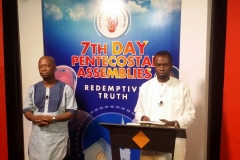God does not turn His back on His People
By Elder Enoch Ofori Jnr
(Sermon, 12th May, 2012)
Text:
I say then, Hath God cast away his people? God forbid. For I also am an Israelite, of the seed of Abraham, of the tribe of Benjamin.
God hath not cast away his people which he foreknew. Wot ye not what the scripture saith of Elias? how he maketh intercession to God against Israel, saying,
‘Lord, they have killed thy prophets, and digged down thine altars; and I am left alone, and they seek my life.
But what saith the answer of God unto him? ‘I have reserved to myself seven thousand men, who have not bowed the knee to the image of Baal’.
“Even so then at this present time also there is a remnant according to the election of grace.
“And if by grace, then is it no more of works: otherwise grace is no more grace. But if it be of works, then is it no more grace: otherwise work is no more work (Rom. 11:1-6).
Could God possibly forsake you?
Loyalty is a fickle business in our world today, a world that has turned self-love into a virtue. The self is an idol to be worshipped and pandered to at all costs. So more often than not, people put money before friendship, materialism before family and personal profit before mutual trust. Personal convenience is the overriding consideration.
It might be tempting to project that attitude onto God. Does He sometimes get fed up with us and somehow seek to dump us?
This was the logical but perplexing question that arose from Paul’s lament for his people Israel in Romans chapters 9 & 10 for their unbelief in Yeshua, their long-awaited Messiah.
In chapter 11, the apostle proceeds to answer the question himself: any such notion that God has rejected His people is untenable; it’s not supported by the evidence! He himself is a living proof that has not rejected His people Israel: “For I also am an Israelite, of the seed of Abraham, of the tribe of Benjamin” (v.1).
That’s a powerful personal example. Paul, a physical descendant of Abraham belonging to the tribe of Benjamin, is not lost. He’s an apostle of the Lord Jesus Christ, and His present life is a remarkable testimony to his assertion that God doesn’t turn His back on His people.
He was a terrible bad news: “a blasphemer, a persecutor and an insolent opponent”. “But I received mercy because I had acted ignorantly in unbelief, and the grace of our Lord overflowed for me with the faith and love that are in Christ Jesus. The saying is trustworthy and deserving of full acceptance, that Christ Jesus came into the world to save sinners, of whom I am the foremost. But I received mercy for this reason, that in me, as the foremost, Jesus Christ might display His perfect patience as an example to those who were to believe in him for eternal life” (1 Tim 1:12-16 ESV).
The secret was that God knew him more than he knew himself, and before all time at that. Like Jeremiah (Jer. 1:5), God had set Paul apart for His work before he was born, and it was only a matter of time before God would call him to preach the gospel, which He did in due time:
“… ye have heard of my conversation in time past in the Jews’ religion, how that beyond measure I persecuted the church of God, and wasted it:
“And profited in the Jews’ religion above many my equals in mine own nation, being more exceedingly zealous of the traditions of my fathers.
“But when it pleased God, who separated me from my mother’s womb, and called me by His grace,
“To reveal His Son in me, that I might preach Him among the heathen; immediately I conferred not with flesh and blood” (Gal. 1:13-16).
And note the circumstances under which the Lord called Paul—he was called whilst in the thick of the systematic persecution mounted against the young Jerusalem Church by the Jewish leaders and was actually on his way to Damascus to hound the Jewish believers there and “bring them bound to Jerusalem”. But “as he journeyed, … suddenly there shined round about him a light from heaven: And he fell to the earth, and heard a voice saying unto him, Saul, Saul, why persecutest thou Me? And he said, Who art thou, Lord? And the Lord said, I am Jesus whom thou persecutest: it is hard for thee to kick against the pricks. And he trembling and astonished said, Lord, what wilt Thou have me to do? And the Lord said unto him, Arise, and go into the city, and it shall be told thee what thou must do” (Acts 9:1-6).
The rest is history, and Paul is where he is now—an apostle of Jesus Christ and an international evangelist and church planter—telling the story of his remarkable conversion to Christ and call to ministry.
It was impossible for God to lose sight of Paul or allow him to be lost. He KNEW him beforehand. Therefore, let the devil do his worst work in him, God would ultimately have him!
What about you? What personal testimony do you have?
Whatever your story may be, I am here to assure you that you are not an accident; you are the product of God’s fulfilled plans for your life, conceived in eternity before you were born. Hear the word of the LORD in Isa. 44:2: “Thus saith the LORD that made thee, and formed thee from the womb, which will help thee; Fear not, O Jacob, My servant; and thou, Jeshurun, whom I have chosen” (cp Ps 22:9-11).
Although we may have a less dramatic story than the Apostle Paul’s, I am sure many of us have a past in which the devil used us in some way. However, God emerged the ultimate winner in our life. Our presence in God’s church as His servants and maidservants involved in the spreading of His Gospel of salvation is a clear proof that He hasn’t rejected us. Since without His intervention and leading we can’t come to Him on our own, we have remained faithful to Him only because He did not reject us in the first place.
If the devil ever gets you confused, assure yourself of this basic truth the apostle so confidently articulates: “God hath not cast away His people which He foreknew” (v. 2). It’s completely out of character for Him to do so. God can’t possibly reject His people whom He foreknew!
We read in Ps 94:14, “For the LORD will not cast off His people, neither will He forsake His inheritance”.
When Israel feared that God would forsake them because they preferred a human king to His rule, in addition to all their disobedience towards Him, Samuel allayed their fears: “the LORD will not forsake His people for His great name’s sake: because it hath pleased the LORD to make you His people” (1 Sam. 12:22).
But still some of God’s people are wont to complain. Hence “Zion said, The LORD hath forsaken me, and my Lord hath forgotten me” (Isa. 49:14). That is why I don’t feel His presence anymore’, they whine, ‘and He hasn’t as yet answered my prayers. The LORD has positively forsaken me; my plight is of no concern to Him’.
If you identify with the above complainers, here’s God’s reply to you:
“Can a woman forget her sucking child, that she should not have compassion on the son of her womb? yea, they may forget, yet will I not forget thee.
“Behold, I have graven thee upon the palms of My hands; thy walls are continually before Me” (vv. 15-16).
What further assurance do you need from God? He says you are INDELLIBLY etched on His palm as a permanent, unavoidable part of Him. In effect, He can’t forget you even if He wanted to. What is more, He sees not in you a Jerusalem whose walls are torn down, but a Jerusalem whose walls are up—restored and beautified! Whether or not you feel or believe it, He has accomplished His salvation work in you. As His servant, He has charged me to tell you:
“Comfort ye, comfort ye My people, saith your God.
“Speak ye comfortably to Jerusalem, and cry unto her, that her warfare is accomplished, that her iniquity is pardoned: for she hath received of the LORD’S hand double for all her sins” (Isa. 40:1-2).
Time will vindicate His truth. Your warfare is over, your iniquity is pardoned!
Grace will always Secure a faithful Remnant
It was one of those things no one in a loving relationship ever wished it happened. The betrayal inflicted a deep pain in His heart. God felt rejected and terribly scorned by His very own people, the apple of His eye. It needed no telling that paying them back in their own coin was in order. But God found Himself in an awkward position—His credibility hanged in the balance. Not because the people were not deserving of His wrath, but because He had committed Himself—and still is committed—not to give up on His people He foreknew. And the commitment was irrevocable. He is the covenant-keeping God; He never goes back on His word.
At the same time, evil must not be left unpunished. Should He not just give up on His people because they had now become thoroughly rotten? Worse, one of His most trusted lieutenants on earth was calling for just that. God was in a really tight corner in the days of the prophet Elijah. Should He continue to keep faith with His people Israel or take just action against them? If He chose the latter, what would that speak of His credibility as a God who does not turn His back on His people?
But then, it was an inexcusably bad case. It was a national catastrophe in spiritual terms. From the king down to the lowly farm hand, all had abandoned the worship of Yahweh, the true and living God; baal-worship was all the rage. Presumably, Elijah was the only follower of Yah; he was the lone face of the true worship. But when the prophet complained to God: “Lord, they have killed your prophets, they have demolished your altars, and I alone am left, and they seek my life” (v. 3), God’s reply to him was, “I have kept for myself seven thousand men who have not bowed the knee to Baal” (v. 4).
The reply showed that God does not reject His people even in the face of severe apostasy. And the lesson is that in the most extreme of cases—when ordinarily all should have been lost—God still keeps faith with His people. So then, no matter what the devil does, no matter the scale of his evil activities aimed at severing God’s people from Him, God will always have a faithful remnant. The moving Parable of Prodigal Son illustrates this truth most powerfully. He was lost to “riotous living” after he took his share of the family property but his father could never forget him; his heart still warmed towards his wayward son. And when the son “came back to himself” and returned home’, the joy of his heart burst out: ”this my son was dead, and is alive again; he was lost, and is found”.
God never forgets His own. However trying the situation, He can never bring Himself to do that. We read in Amos 9:8-9:
“Behold, the eyes of the Lord GOD are upon the sinful kingdom, and I will destroy it from off the face of the earth; saving that I will not utterly destroy the house of Jacob, saith the LORD.
“For, lo, I will command, and I will sift the house of Israel among all nations, like as corn is sifted in a sieve, yet shall not the least grain fall upon the earth”.
As we saw in Elijah’s day, not even transgression—which God hates with a passion—can permanently alienate God’s people He foreknew from Him. There will always be a faithful remnant.
Indeed, He has bound Himself with the strongest oath possible to make sure it’s impossible for Him to forsake His people Israel:
“Considerest thou not what this people have spoken, saying, The two families which the LORD hath chosen, He hath even cast them off? thus they have despised my people, that they should be no more a nation before them.
“Thus saith the LORD; If My covenant be not with day and night, and if I have not appointed the ordinances of heaven and earth;
“Then will I cast away the seed of Jacob, and David My servant, so that I will not take any of his seed to be rulers over the seed of Abraham, Isaac, and Jacob: for I will cause their captivity to return, and have mercy on them” (Jer. 23:24-26).
So what does ‘the trick’ for God? What ensures that He always has a remnant secured for Him?
It’s GRACE: “Even so then at this present time also there is a remnant according to the election of grace” (Rom. 11:5). In other words, to this “present time”, as in all generations, God has reserved to Himself “a remnant, chosen by grace” (ESV).
This is the heavenly guarantee!
The unfailing grace of God—as against human effort—always ensures that a remnant of God’s people is reserved for Him (vv.5- 6). Because the preservation of “a remnant” does not depend on weak and unreliable human effort but on unfailing grace, God will always have a remnant to ensure that He stays ever faithful to “His people whom He foreknew”.
At no time in history has God been without faithful people—because He never forsakes His people He foreknew by keeping from them the knowledge of His truth. In the Dark Ages when false doctrines were being rammed down people’s throat under pain of death, He still had faithful people. Persecuted believers like the Waldenses, Albigenses, and Hugenots soldiered on in the truth at the peril of their lives. God did not fail to let them know His will.
He who is ever faithful will not fail us now!
In these “perilous times” of the end when abominable lifestyles like homosexuality are being endorsed and glamourized by the world’s powerful men like US President Barack Obama—who this week publicly expressed his ‘personal support for same-sex marriage”—grace will secure an enclave of faithful saints in every nation on the face of the earth who will not bow the knee to the idol of homosexuality, even though Mr. Obama’s pronouncement has triggered a global push for the recognition and legalization of ‘gay marriage’ around the world.
That was why the prophet Isaiah prophesied: “Except the LORD of hosts had left unto us a very small remnant, we should have been as Sodom, and we should have been like unto Gomorrah” (Isa. 1:9). That “very small remnant” is the handiwork of grace. Wholly grace. If not, who will continue to have the moral courage to stand up to these ‘pro-gay’ famous and powerful men of the world in an age in which righteousness seems to be on the losing side and those who stand for godly values are on the fringe of an ‘enlightened society’, which tags them as bigots and cavemen? But God will have His faithful followers. Because to this day 2012, there’s still “a remnant chosen by grace”!
The side to which you belong in the ongoing culture war could indicate whether you are part of the remnant family of God on earth. The whole world lies under the control of the devil (1 John 5:19), but the minority chosen by grace will endure in righteousness to the end.
We are privileged to be part of this chosen few. It’s to us that “all things work together for good”:
“And we know that all things work together for good to them that love God, to them who are the called according to His purpose.
“For whom He did foreknow, He also did predestinate to be conformed to the image of His Son, that He might be the firstborn among many brethren.
“Moreover whom He did predestinate, them He also called: and whom He called, them He also justified: and whom He justified, them He also glorified.
“What shall we then say to these things? If God be for us, who can be against us?” (Rom. 8:28-31).
God who foreknew us has made all the provision for our salvation to object of which is to share in the glory of Christ. In advance of this ultimate objective, God foreordained us to be like His Son in character, after which He called us through repentance and faith in His Son, and then declared us righteousness on the basis of faith and obedience (Rom. 3:24-25, 2:13). Now we are “glorified” and bound for glory. To us victory is guaranteed; nothing shall be against us.
Although we will face storms, “walk through the valley of the shadow of death”, we will have no cause to fear. He’s with us “to the end of the world” (Matt. 28:20). That’s why I have unshakeable faith in this work. God who foreknew us WILL NOT forsake us (Heb. 13:5). Everything we will become was foreordained for us, and He will complete His “good work” begun in us. Amen!



